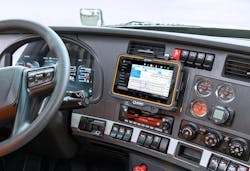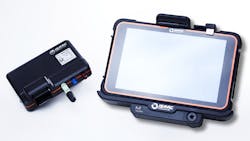Isaac Instruments’ in-cab technology a ‘gamechanger’ for tank truckers
Technology providers have developed and deployed applications to solve problems in every transportation-related process over the years, from hours-of-service (HOS) logging to asset tracking, dispatching, and more.
Now there are so many apps, their proliferation is the pain point. “One complaint we hear from drivers is that they need usernames and passwords for multiple apps, so we wanted a provider who would help us simplify that whole environment,” said Nicole Gabel, vice president of process improvement at Quality Carriers (QC).
She found what QC was searching for in Isaac Instruments.
The Canadian in-cab technology provider broke into the bulk sector with Tandet Logistics and added Trimac Transportation to its tank truck roster in 2017. And not only did Isaac and its ruggedized tablets simplify drivers’ duties, they maintain, it also made them safer. Trimac and Tandet both credit Isaac with helping them win National Tank Truck Carriers’ North American safety championship in the last four years.
Quality Carriers is the latest bulk fleet to climb on board, revealing in January it intends to outfit its entire fleet of more than 2,500 trucks with Isaac’s versatile electronic logging devices (ELDs) and “driver-centric” fleet management tools by the end of the year. They installed the system on the first eight trucks in May, and expect to conclude pilot tests this month, Gabel said. “We were looking for a provider who could bring us more solutions,” she said. “We had these units in all the trucks, and we we’re using them for hours of service and dispatching, but we knew there was a lot of potential to put more solutions at drivers’ fingertips.”
Isaac’s integratable, open-platform system provided the palette, streamlining access to an array of customizable offerings, including real-time coaching, digitized driver-vehicle inspections reports (DVIRs), and advanced telematics capabilities—all displayed in one intuitive interface “future-proofed” for endless utility.
See also: Service Transport, Lacy's Express collect 2021 Heil trophies
“Two of the top bulk carriers in North America are using our product, so we’ve had success in this environment,” Jean-Sébastien Bouchard, Isaac’s co-founder and executive vice president of sales, told Bulk Transporter. “People come to Isaac because they want the automation, but they also want to keep things simple for the driver.
“Reliable and simple—that’s where we’re the gamechanger.”
Game-changing growth
Bouchard, chairman and CEO Jacques DeLarochellière, and chief technology officer David Brillon founded Isaac in 1999. Initially, the company used its signature, telemetry-powered “recorder”—which today aggregates and measures more than 40 vehicle parameters up to 100 times per second, and serves as a wireless communications access point—to teach race car drivers to go faster. They targeted transport in 2009, then zeroed in on trucking in 2014.
“We were ready,” Bouchard said. “Our customers are our best salespeople. We’ve grown through glowing references, and we want to maintain that. But to do so, we have to be careful not to outgrow ourselves, and proceed at the right pace, with good, controlled growth that ensures our infrastructure, and support for existing clients, grows at the same pace we’re growing with new customers.”
The company’s southern advance also comes at the right time for companies looking to take their technology to the “next level,” and unite fragmented transportation services on a dependable, driver-friendly device that eliminates unnecessary clicks, Bouchard said. “A truck driver takes that position because he wants to drive a truck,” he said. “They don’t want to play with their phone or tablet, and waste time keying in a bunch of information.
“They’re not IT specialists. For them, entering information on that device is a pain.”
‘Meaningful’ improvement
Deryk Gillespie, Trimac’s vice president of technology and innovation, spoke about his company’s partnership with Isaac during a Truckload Carriers Association webinar on how real-time coaching can improve the driver experience, safety, and fuel consumption. He pointed to several system benefits, but said what pushed Trimac “over the edge” was Isaac’s ability to deliver live, actionable driver feedback.
“We really liked that the feedback was presented to the operator at the time and place they could actually do something about it,” Gillespie said in the discussion. “We didn’t think it was especially useful that, a week or two after the fact, a driver is called into somebody’s office and told they could have done better last week.
“That would have been good to know last week.”
Fleets can immediately boost driver safety and efficiency using real-time advice and visual alerts generated by the Isaac Coach. Gillespie said some trucks have reduced fuel consumption by as much as 11%, and Trimac is seeing real-word savings of 2-3% fleet-wide—results he called “meaningful.” “That’s huge,” Bouchard agreed. “When you think of a company spending $100 million a year in fuel, what’s 3% of the operation?” Driver “scores” disregard factors out of their control, like weight, terrain, conditions, and even vehicle year, make, and model; and aren’t based on miles per gallon, which don’t tell the whole story.
“We score drivers on their performance, and that is based on using the pedal,” Bouchard said. “If you get a driver who scores 98% using the Isaac Coach, you know that driver has done everything they can to turn in the best miles per gallon with the equipment, load, and trip you assigned them.”
Isaac scores are tied to Trimac’s incentive program for company drivers, and contractors are appreciative of the system’s ability to help them save money on increasingly expensive diesel fuel, Gillespie said. Customers and partners reap rewards as well, Bouchard added, with the corresponding reductions in greenhouse gas (GHG) emissions supporting their efforts to meet supply-chain sustainability goals.
“(Trimac’s) past the honeymoon phase with this partnership,” Bouchard said. “They’re deep into it—and they’re raving fans.”
Upgraded appreciation
So are the QC drivers who previously worked with Trimac—and already knew Isaac would improve their lives, Gabel said. “When they found out Quality Carriers was bringing Isaac onboard, they got so excited,” she said.
“We’ve already started to get feedback from the drivers, and it’s very positive,” Gabel said.
QC chose Isaac to help them go paperless, where possible, and to deliver training through the tablet, allowing drivers to meet requirements on the road. “That was something, historically, we could never do,” Gabel said. They also rarely removed the previous devices from their cradles. Now drivers can take them outside the truck to collect signatures, enter pre- and post-trip inspection information, and capture images for shop technicians, without fear of damaging the units. Gabel said her team purposely abused them, and they emerged unscathed.
See also: Quality Carriers upgrades ELDs, fleet management
“They’re really good tablets,” she said. “Now we can provide all of the business-critical items drivers need on a single device.” And what’s good for drivers is good for trucking—which goes nowhere without them.
“The limiting factors these days are drivers and tractors, so it’s about who can deliver the best pay and driver experience,” Gabel continued. “And when you talk to drivers, pay only goes so far. They also want an environment where they’re treated with respect and have an overall great working experience, and technology is a big piece of that. So if you can bring in something that makes their jobs easier, it’s a great recruiting tool.”
Efficient execution
Isaac’s system further enables digital document storage, distribution of company communications, and automated invoicing for faster cash flow, all housed in a company-owned device, instead of a driver’s cell phone. “We’re getting into this world where folks are wanting us to seriously invade drivers’ privacy by having them install all these apps on their personal phones, which creates a privacy concern, but more importantly a safety concern, because you don’t have the ability to lock those devices while vehicles are in motion,” Gillespie said.
“Execution is the challenge—not debating the algorithms or weighting.”
And sticking with Isaac is easy, Bouchard asserts. Automated processes keep leaders from managing their businesses via email, Isaac is perpetually expanding partnerships and features, with four software updates per year, and the system pays for itself by unlocking cost savings. “You don’t need many hours of downtime to justify the investment,” Bouchard said.
“Our solution is ‘set and forget,’” he concluded. “The solution is there, it works, and you can concentrate on your trucking operations, and addressing your trucking challenges—not on the device in the truck.”
About the Author
Jason McDaniel
Jason McDaniel, based in the Houston TX area, has more than 20 years of experience as an award-winning journalist. He spent 15 writing and editing for daily newspapers, including the Houston Chronicle, and began covering the commercial vehicle industry in 2018. He was named editor of Bulk Transporter and Refrigerated Transporter magazines in July 2020.






